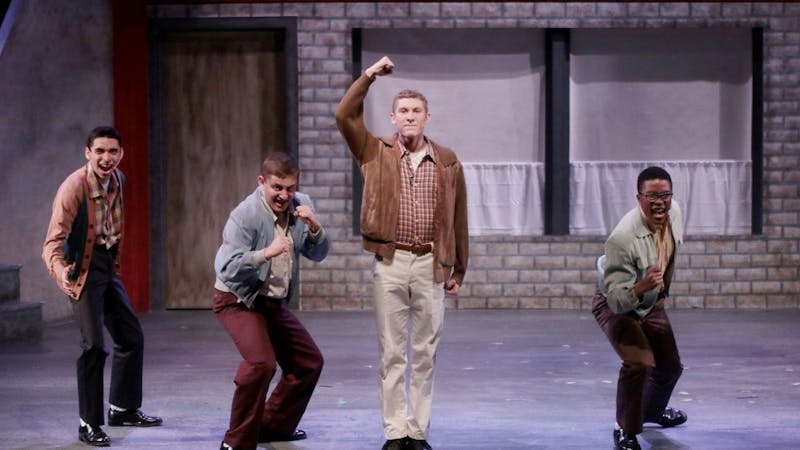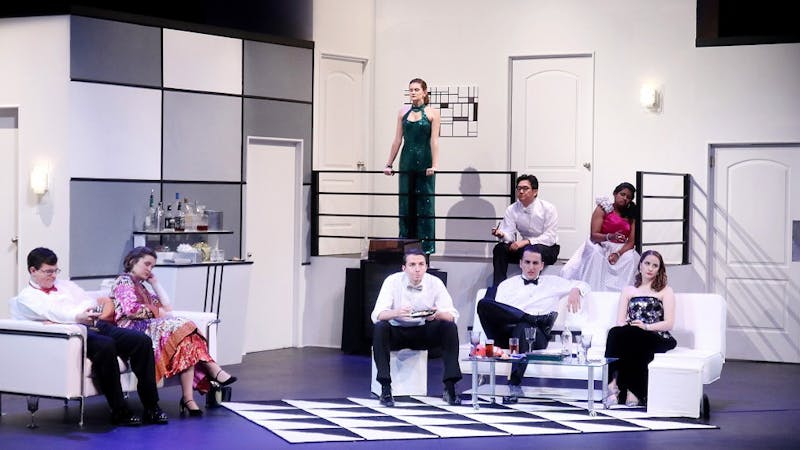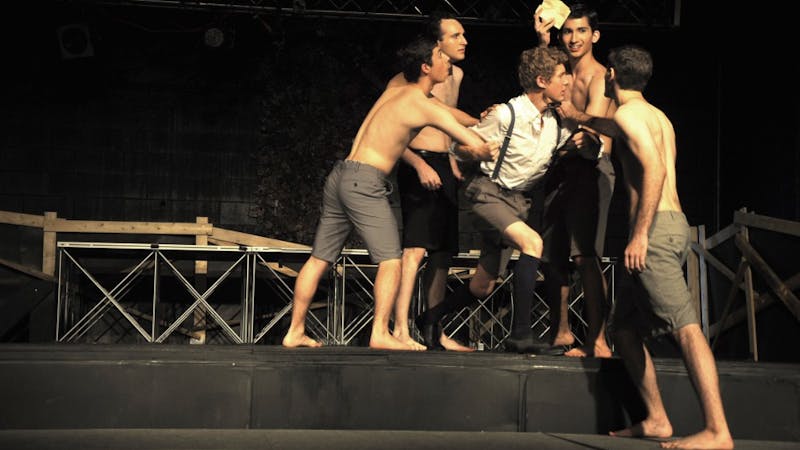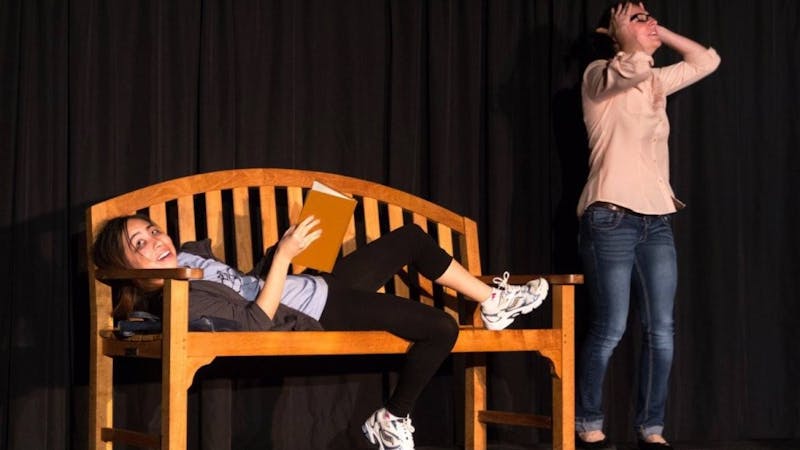
Talent balances troubling themes in ‘Dogfight’
Despite issues with the script, the Rice Theatre Program and Rice Players’ production features some of the best acting and musical talent that its producers have to offer.

Despite issues with the script, the Rice Theatre Program and Rice Players’ production features some of the best acting and musical talent that its producers have to offer.

In the midst of that epistemological turmoil, the Rice University Theatre Program’s production of “Rumors,” directed by Rice Theatre Director Christina Keefe, is a welcome reminder that it is okay to laugh at misinformation.

If you are anything like me, your first experience with sexuality was not the suave, controlled, balletic interplay of gleaming flesh and whispered confidences that is so often presented as the norm in popular culture.

It is clear that our country currently faces a charged political environment. Whatever views one holds about the upcoming election, it is easy to be swept up in the virulent language that each side vigorously deploys.

The unique power of myth is simplicity. By reducing characters to a few key traits and flaws, myths allow a reader to reflect on those qualities in their own life. In contrast to myth, real life is complex and difficult to understand, filled with self-contradiction, unclear motivation and shades of gray.

What does it mean to protest? Can one really commit time, energy and willpower to a cause greater than their own self-interest, and do so without reservation? In The Rice Players’ production of “The Altruists,” directed by Rice alumna Susannah Morgan Eig (Jones ’14) and written by Nicky Silver, these questions are answered with a resoundingly ironic shrug. The play’s caricature of bohemian Manhattan is rife with social justice, higher causes and irate protesters, but these do not form the conflict of the piece. Rather, much like its vain characters, the play focuses on the petty personal conflicts of its so-called protagonists, and the result is a fantastic work of satire that forces the viewer to re-examine their own actions and question how truly altruistic they are. At only five cast members and a running time of 90 minutes, “The Altruists” is a small play in everything but subject matter. The play is in large part an ensemble production, starring Jones College sophomore Justin Bernard as Ronald, a bleeding heart social worker; Lovett College freshman Hannah Tyler as Sydney, a wealthy and shallow soap opera actress; Martel College freshman Alan Kim as Lance, a drug-addicted prostitute with a heart of gold; Sid Richardson College freshman Abby Sledge as Cybil, a self-described “lesbian politically” and protest aficionado; and Brown College senior Chris Sanders as Ethan, an abusive, penniless disestablishmentarian. Tyler’s performance is especially interesting, as she delivers her lines with the overblown emotion of soap operas, in sharp contrast to the other actors’ muted performances. These few over-the-top characters embody a large swath of viewpoints from which people approach social justice, giving the play’s satire a surprisingly broad effect.“The Altruists” begins as this eclectic group of friends prepares for a protest — the cause for which, ironically, none of them can remember — the morning after a decadent party. Though this protest is ostensibly the primary concern of the entire cast throughout the play, it is mentioned only in passing, or brought up whenever there is a lull in interpersonal drama. This discrepancy between words and action is a consistent theme throughout the play. Even Ethan and Cybil, the most radical protesters in the cast of characters, do not seem concerned with the actual cause they are supporting or opposing, and get just as wrapped up in the personal conflicts that form the majority of the plot. The greatest strength of “The Altruists” is in its development of these contradictions, and despite its exaggerated characters, the play manages to communicate its message through subtle emotional cues. In fact, the writing is so strong that some of the later scenes deliver an unexpected emotional punch, as even the audience’s attention is swayed from the casually mentioned social causes to the smaller-scale issues of the play’s action.“The Altruists” is also assisted by incredible set and lighting design. Though the action of the play takes place in just three bedrooms, this minimal placement is brought to life by an abundance of care and effort put into the set design. Each character’s room is entirely characteristic of their personality, from Sydney’s tastefully decorated space to Ronald’s disorganized, newspaper-filled one. As the play occurs entirely in three characters’ apartments, set and lighting cues are imperative to signal cuts between locations within a scene, and the play makes ample use of selective lighting to quickly direct the audience’s attention. The effect highlights parallels in characters’ dialogue within a single scene. Overall, the set and lighting choices communicate a great understanding of the purpose and rhythm of the play on the part of the crew.Though it is billed as a comedy, “The Altruists” will not have many people laughing uproariously in the aisles. The play is certainly funny and well-acted but its heavy themes and morally bankrupt ending ultimately weigh the play down too much for one to walk away lighthearted. However, this is not a bad thing; “The Altruists” is just as concerned with criticizing and remanding its audience as it is with entertaining them. It is clear that the audience is meant to come away from the play with a simple, not at all comedic message: We are all hypocrites in some respect, no matter how many protests we go to, how many petitions we sign, how many clothes we donate to Goodwill or how much time we spend debating the social causes of our day. In the end, almost no one is really an altruist.

An improvisational comedy show, a one-act play, a short story and a theater revue all have something in common: They seek to entertain in a short period of time. In an improv show, the hilarity of a constructed situation is constantly exploited; in a one-act play, constraints on length keep the action moving for the play’s duration; in short stories, the plot is often structured like a joke, with tension building to a punchline. For theater revues, however, there is no set structure. Consisting of scenes from different plays, revues are naturally somewhat eclectic and should have a unifying theme of some kind. Taking into account that loose dictum, those who put together a theater revue still have the entire catalogue of theater to choose scenes from. The ability to select scenes that work well in the format of a revue is in large part what separates directors of enjoyable theater revues from directors of more mediocre productions. Unfortunately, Hanszen Theatre’s “Benchmark: A Theatre Revue,” directed by Hanszen College junior Rachel Buissereth, is marred by an absence of this selective ability.The intended theme of “Benchmark” is, somewhat cheekily, the very bench that its title suggests. A bench, however, is not enough of a unifying idea to tie together “Benchmark,” which is for all intents and purposes a mixture of scenes whose emotional tenor and content do not in any way flow. The revue begins with a scene from “Blondes” dealing with gendered experiences on college campuses, transitions all too quickly into a monologue about 9/11 and from there proceeds through scenes dealing with marital strife, prostitution, dystopian technocracy, the death of a loved one and a terrible first date. No scene prepares you for the experience of the next, and the jarring experience of transitioning from the screaming of a woman fighting an oppressive society to a mellow, contemplative song about past love is very confusing. It is worthwhile to note here that each scene in the revue has its own director, which may contribute to the lack of cohesion.Beyond its issues with scene selection and tone, “Benchmark” also suffers from a lack of effective emotional acting in its non-musical scenes. In every scene involving anger or intense emotion, the cast suffers from the common misconception that yelling or speaking loudly is equivalent to expressing strong emotion. The acting in other scenes of “Benchmark” was also somewhat flat and stilted across the board. In “Blondes,” Jones College sophomore Kevin Mullin and Baker College freshman Sriparna Sen are supposed to be engaging in a discussion about sexuality, but the scene comes off as two people giving individual monologues. The actors’ confident tones do not match their self-deprecating words. A similar effect occurs in a scene from “Closer,” where a conversation between Hanszen College senior Thomas Weinlandt and Baker College senior Katherine Gunn about the beginning an affair feels so cold and impersonal that they might as well be discussing the bench behind them. By far the best parts of “Benchmark” are the musical numbers. From the opening ensemble performance to the finale taken from “Rent,” the singing in “Benchmark” is phenomenal and powerful. Not only are the singers talented, the combination of live accompaniment and simple direction lend these musical scenes an emotional depth not matched in the remainder of the revue. Hanszen freshman Abigail Panitz singing “See I’m Smiling” and Wiess College junior Helen Gunn singing “I’ll Be Here” are notable standouts in this regard, as both women clearly understand what they are singing and convey their messages well in the minimalist setting. It is my hope that in the future Hanszen Theatre will spend more time directing such singing and less time on the influences that led to the underwhelming remainder of “Benchmark.” In broad strokes, this would involve more contemplative, understated acting and a focus on scenes that go well together and deliver a cohesive, effective message. A more substantive theme would have improved “Benchmark,” as well as the choice of fewer scenes involving raised voices in exchange for more complex, realistic emotional situations. Future theater revues could also benefit from the incorporation of additional musical acts, as there seems to be plenty of unexplored talent in this area.
A month from now, four theaters in Houston’s historic East End will be taken over by one of the more eclectic collections of music, theater and dance in Texas, otherwise known as the Houston Fringe Festival. Running Sept. 24 to 27, the Houston Fringe Festival will feature a “neo-burlesque troupe,” several multimedia dance projects and a play about Zelda and F. Scott Fitzgerald, among many other projects. Right in the middle of the artistic fray is The Speak Up Project, a play written, performed and directed by Rice students that explores the reality of sexual assault through a variety of perspectives.The Speak Up Project, which includes ten monologues written anonymously by Rice students who have experienced sexual assault or harassment, is intended to spread awareness about sexual assault on college campuses and to give sexual assault victims a platform for sharing their experiences. Vicky Comesanas, the director and producer of The Speak Up Project, said the project largely came from a feeling that sexual assault on campus was not yet adequately addressed. “My friend and I kept hearing stories in the news about sexual harassment and sexual assault, which made us want to do something to help,” Comesanas said. “We are both really into theater, so naturally we decided that a play was the best way to spread our message.”Comesanas said she was also motivated by what she felt was very minimal media coverage of sexual assault, which she said produces apathy about the issue on college campuses.“The news coverage of sexual assault … is usually so general and sparse,” Comesanas said. “I think that because of that, a lot of students at Rice have the attitude that it couldn’t happen here, or that the general trend doesn’t affect us. The reality is that it happens all the time, but various social mechanisms prevent people from reporting.” Comesanas said that despite recent increases in reports of sexual assault, she still believes many college students still feel afraid to share their experiences. She said she hopes the play makes it easier for victims to tell their stories and helps start a conversation about the local culture around sexual assault.“That’s why the play is called The Speak Up Project: We want to give victims of sexual assault a way to make their voice heard anonymously.”The Speak Up Project not only affected the audience and the writers, but also the actors. Comesanas said many of the people involved in the play are now personally invested in preventing sexual harassment at Rice because of their engagement with the monologues they are performing. “In a very real way, the actors help carry the student writers’ burden,” said Comesanas. “When an actor is performing such an intense, personal monologue, it becomes difficult to separate the actor’s own feelings from the writer’s.”McMurtry College sophomore Lenna Mendoza, one of the actresses in the play, said she feels the format of the project conveys a unique reality about sexual assault that could not be expressed in most other mediums.“The Speak Up Project provides a crucial alternative dialogue about issues of sexual violence and discrimination which doesn’t rely on euphemism and statistics,” Mendoza said. “Instead, [it] allows us to hear the voices of survivors.”The initial showing of the play in spring 2015 was well-received and many audience members claimed it sparked a conversation about non-reporting at Rice. Hanszen College junior Rachel Buissereth, who attented the play when it was performed in Willy’s Pub in March, said the play was a significant piece of art and very empowering. “The Speak Up Project was a huge healing step for sexual assault in the Rice community, serving as an educational as well as emotional piece,” Buissereth said. “I walked away from The Speak Up Project ... feeling vulnerable, yet ready to fight for those who had been victims of sexual assault.”Comesanas said she sees the Houston Fringe Festival as a great opportunity to raise awareness in a wider setting. “I am a big believer in the whole ‘art as activism’ movement, and that was the biggest motivation for taking The Speak Up Project to the Houston Fringe Festival,” said Comesanas. “I’m hoping to get people interested in the project and to find investors who can help us take the play to other college campuses.”In addition to bringing the play to other college campuses in Houston, Comesanas said she is considering creating another version with new Rice students. Those interested in anonymously writing a monologue about their personal experiences or acting in this new version of The Speak Up Project can contact Comesanas at vicky.comesanas@rice.edu. The current version of The Speak Up Project will be performed Sept. 24 at 9 p.m. and Sept. 27 at 4:30 p.m. at the Super Happy Fun Land theater. Tickets can be purchased at the door or at houstonfringefestival.org.